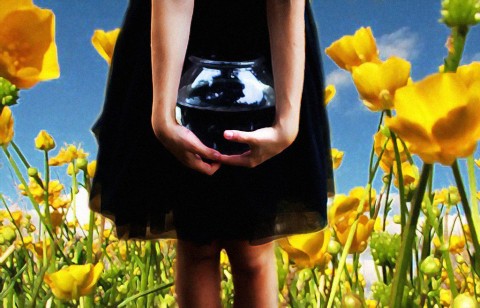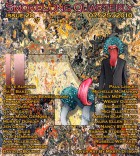That spring, everyone longed for butter. Five-year-old Iris waved bright yellow flowers in front of their faces. “Do you like butter?” She ground the pollen against their chins and the tips of their noses. “Ah-ha. Yes, you do… and do you like butter?”
The mother, Rose, had needed space to grieve for her boyfriend, who had needed space from her. “How much space?” she asked him. “A closet full? Or are we talking real estate?”
“Think astronomy,” he said.
So she brought her two daughters to this cabin in the hill country. The place had belonged to her uncle, who hadn’t remembered to go there during the last ten years of his life. When Rose’s aunt mentioned selling it, Rose said, “I’ll clean it out for you, if my girls and I can spend April there.”
What the cabin lacked in furniture, it made up for in cobwebs and kudzu. A perfect place to be miserable, Rose thought. But she hadn’t bargained for the acid-washed moon, or stars like paper lanterns, or the field behind the cabin, which flamed with Indian paintbrush, giving way to white-tipped bluebonnets, and finally the buttercups. Iris jammed the flowers’ stems into her hair, threaded them through her button holes, and stuffed them in her pockets, imagining herself a garlanded maiden. She looked like a parade float had exploded on her.
The older daughter, Daphne, longed for her boyfriend, Nathaniel, but since he was so far away, she found herself more and more partial to butter. She spread it over slices of white bread and drizzled sugar from the edge of her palm, forming the letters of his name, which never fit on just one slice. She began to sleepwalk. In the mornings, the kitchen floor was grainy with sugar, and slick with melted yellow pools. And every day, when she woke up, Iris was sitting at the foot of her bed clutching a fist full of flowers, asking the same question, “Do you like butter?”
After all the days Rose and her daughters spent under the cabin’s roof, after all the cobwebs she swept from the corners, and all the daddy long-legs she carried outside, the place still felt abandoned. She discovered a dry goldfish bowl in a closet. It held a few stalks of plastic seaweed and a ceramic cave: an empty house inside an empty house inside an empty house. She lifted the cave, half expecting to find a fish skeleton, but there was nothing. Not even a fish ghost.
Iris, lipstick-smeared, burst into the room, waving a bouquet. She stamped Rose’s bare arms and face with pollen prints, while singing, “Yes you do! Yes you do!” Rose did like butter, but she was afraid of it too, the way a rusty cog is afraid of oil. But she also knew the flowers wouldn’t last much longer. So she set a pat of butter on her tongue like a communion wafer, filled the goldfish bowl with water, and waited.



 The SmokeLong Grand Micro Contest (The Mikey) is now an annual competition celebrating and compensating the best micro fiction and nonfiction online.
The SmokeLong Grand Micro Contest (The Mikey) is now an annual competition celebrating and compensating the best micro fiction and nonfiction online.